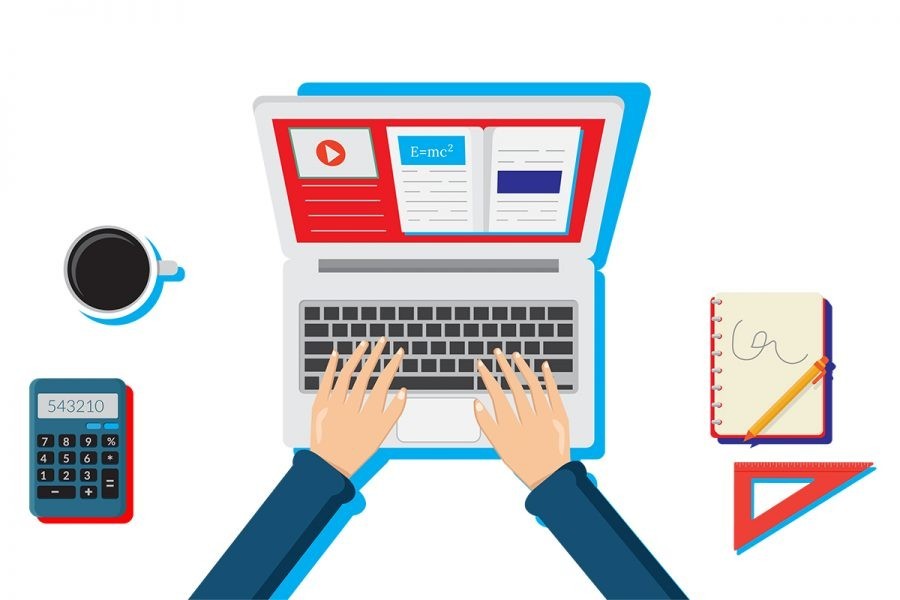The period of the last July-August witnessed the full-scale beginning of the era of online examinations at the country's schools. Private schools in the urban areas dominated the scene. One particular feature has distinguished the whole online exams scenario. It is the spontaneous and positive response of the parents to the whole exercise. Among other things, a feature that became noticeable in the parents' post-exam assemblages at schools was their eagerness to submit the exam scripts of their wards. It is indeed amazing to mark out the fast pace at which the urban educated women have picked up the style of digital classes during the long corona-prompted school closure.
The gadgets and facilities of the smart-phone video screen, YouTube, Zoom etc have now become commonly used terms among both the parents and students. Thanks to the online-friendliness developed by the parents, corona-time online classes and exams at home now do not seem cumbersome. The collection of the scripts for mid-term exams opened at some schools nearly two months earlier. According to observers, the government-run schools appear to be lagging behind in this radical turning-point in the country's school education. With the students being deprived of taking their half-yearly exams online in the vast rural areas, many learners do feel disillusioned. Due to their wards being kept out of the opportunity of sitting for this vital examination, they have reasons to feel discriminated against. Many city and town-based government high schools have also emerged as cases facing the students' deprivation of online classes; as well as the following exams.
A lot of schools suffer from shortage of funds to put online networks in place. Simultaneously, many students are technically incapable of affording online outlets. As educationists view the scene, on falling victim to this unexpected academic disruption, young learners may start detecting the seeds of 'class divisions' in society. Many parents brace for a pervasive discrimination among the country's student communities. In a broad definition, the situation may be interpreted as urban upper-class students being pampered, and those in the rural areas are left out with few facilities. Except the sensible sections in society, parents and other elders in general could hardly try to understand the reality. Being overpowered by emotion, many would remain oblivious to a lot of hard truths. These include the corona-triggered countrywide deadlock, difficulty connecting remote rural areas with electricity --- and, thus, internet connection, and the average village students' inability to afford computers or smart-phones. The last drawback hinders also many infrastructure-wise weak urban schools and their students from having access to online classes. Unlike their counterparts at internet-connected schools, they have been deprived of class tests and the major examinations over the last 4/5 months.
Upon taking an in-depth look at the country's school education during the corona pandemic, one finds lots of government and non-government high schools in Dhaka and the other cities to be deprived of foolproof online facilities. To those functioning in a humble manner, internet opportunities are, in fact, a chimera. For students studying at these schools, there are the classes broadcast by the government-run Sangsad TV. Their effectiveness is often brought into question by the teachers, as well as education experts.
It's true there are no quarters which can be singled out to take the blame. Since the policymakers even in many highly developed but severely pandemic-hit countries have started feeling perplexed over their schools, the state of the poorer corona-hit countries can be understood. Bangladesh is one of them. Unlike others, this country has long embarked on grand projects to take the ICT facilities to all parts of the country. Unfortunately, when it had started getting benefits of online communications, the COVID-19 hit the country like a bolt from the blue. Had the pandemic disruptions not abruptly slowed the progresses being made in the country's online educational activities, Bangladesh might have got a lot of mileage from the sector. The country has long proved its capability to embark on the information superhighway. The ongoing pandemic shouldn't be allowed to spoil the grand venture, especially targeted at the education sector. The corona disruptions have amply proved that in such national crises, online networks emerge as the only way out. Though viewed as a stop-gap solution for now, the internet connections' long-term impact on education is beyond doubt. Highly startling it might sound though, many Bangladesh cities and towns have lately started conducting private tuition and various coaching classes online. All said and done, the basic requirements of unhindered electricity, capabilities to avail the online gadgets ought to be the foremost priorities.
The way things continue to unfold, Bangladesh can be termed a most suitable candidate for being included in the global online education sector, say academics. They note that since the online education is mainly urban area based, parents would eventually be eager to see rural schools as part of urban extensions. In fact, it is high time the major stakeholders shifted their focus to the immediate issues. It is expected that on being fully equipped with the online system, all government schools, too, will soon join the era of virtual education. Still, the advocates of online-based education should keep in mind that this curricular mode should be reserved only for the time of emergencies. It will always be a stop-gap remedy.


